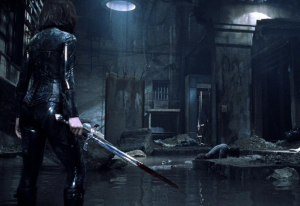Cullen Bunn and Jesus Harvas continue the unsettling story of the Empty Man in a brand-new BOOM! Studios series.
Videos by ComicBook.com
Back in 2015, Bunn and artist Vanesa R. Del Ray introduced the Empty Man virus via a six- issue miniseries. The Empty Man was a horror series with a rather interesting hook: people were going insane due to a mysterious virus that caused vivid hallucinations and brutally violent suicides and/or murders. However, the virus seemed to be almost sentient, as many of the victims claimed that their actions were guided by “the Empty Man.”
The Empty Man was Bunn at his finest, crafting a unique horror story that felt both familiar and brand new. The first miniseries had a bit of everything — body horror, unknown evils, cults, the supernatural, and good ol’ fashioned human weakness — but it never felt overburdened or overstuffed with horror cliches and tropes. Everything seemed to flow naturally and organically from the core premise that the world was slowly succumbing to a supernatural disease.

After a three-year hiatus, The Empty Man returns in a new series. Most of the introductory issue is spent re-establishing how the Empty Man virus has impacted the world like how cults worshipping the Empty Man are now widespread, and the CDC and FBI are becoming increasingly draconian in their fight against the disease. The new series also wisely focuses on how this virus affects everyday people, amplifying the horror elements by showing its impact on a micro level.
The new series hones in on a typical suburban nuclear family grappling with the Empty Man disease. The wife, Melissa, has become infected by the Empty Man, but still has some hold on her lucidity. Instead of reporting her case to the CDC, her husband Andrew “Empty Man-proofs” the house in an attempt to minimize the harm she can do to herself or to her family. While the daughter Vicki tries to maintain a “normal” life, she still feels the presence of the Empty Man in school when she and her classmates take a mandatory test looking to root out possible infectees.
The most interesting choice in this new Empty Man series is focusing on the virus as a disease. The first miniseries established a strange mythology where the virus seemed to be guided by a sentient force and could create terrifying monsters at will. This new issue largely avoids all this, re-framing the Empty Man virus as a disease with grotesque side effects with no known cure. This is probably due to the creative team prioritizing reestablishing the book’s setting and introducing new characters in the first issue, but the comic unnecessarily is holding back its main hook. The Empty Man virus isn’t just a disease; it’s something entirely different and much, much more terrifying. That’s not communicated very well in the first issue, and it’s to the book’s detriment.

Jesus Harvas takes over from Vanesa R. Del Ray as the primary illustrator of the series and brings a slightly different feel to the book. While Del Ray and Harvas have similar styles — each uses a similar rough sketch-like art style that adds a level of grittiness to their work — Harvas uses more conventional layouts and panel composition than his predecessor. Del Ray seemed to delight in using negative space to establish tone, with backgrounds blotted out by shadow or pages with triangular panels on a backdrop of white. Harvas uses none of that in his artwork, giving each panel more of a background. While there’s nothing wrong with Harvas’ artwork (in fact, I like how he draws people a bit more than Del Ray did in the original series), his safer approach makes the comic feel a bit more mundane and similar to many of the other horror series out there.
Ultimately, The Empty Man plays it safe in the first issue, not really utilizing any of the true creepiness of the original miniseries. The core premise presented in this issue should still be enough to hook most readers, but there’s a lot more that The Empty Man has to offer.
Published by BOOM! Studios
On November 7, 2018
Written by Cullen Bunn
Art by Jesus Harvas
Colors by Niko Guardia
Letters by Ed Dukeshire








